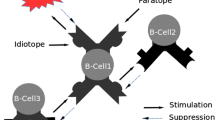Abstract
The biological immune system is a complex, adaptive, pattern-recognition system that defends the body from foreign pathogens. The system uses learning, memory, and associative retrieval to solve recognition issues and classification of tasks. In particular, it learns to recognize relevant problems, remember those encountered in the past, and uses combinations to construct problem detectors efficiently. This paper explores an application of an adaptive learning mechanism for robots based on the natural immune system, using two algorithms, viz., the behavior arbitration mechanism and the clonal selection algorithm to demonstrate the innate and adaptive immune response respectively. The work highlights the innate and adaptive characteristics of the immune system, wherein a robot learns to detect vulnerable areas of a track and adapts to the required speed over such portions. A detailed study of the artificial immune metaphor is carried out and mapped onto the robot world. The robotics test bed comprised of two Lego robots deployed simultaneously on two predefined near concentric tracks with the outer robot capable of helping the inner one when it misaligns. The inner robot raises an SOS signal on misalignment. The outer robot aids the inner robot to regain it alignment exhibiting the innate immunity. The adaptive system within the inner robot learns to tackle the problem in future using Clonal Selection mechanism.
Preview
Unable to display preview. Download preview PDF.
Similar content being viewed by others
References
de Castro, L.N., Timmis, J.: Artificial Immune System: A New Computational Intelligence Approach, 1st edn. Springer, Heidelberg (2002)
Bell, G.I., Perelson, A.S.: An historical introduction to Theoretical Immunology. In: Theoretical Immunology (eds.), pp. 3–41. Marcel Dekker Inc., New York (1978)
Coleman, R.M., Lombard, M.F., Sicard, R.E.: Fundamental Immunology, 2nd edn. Wm. C. Brown Publishers (1992)
Colaco, C.: Acquired Wisdom in Innate Immunity. Imm. Today (19), 50 (1998)
Carol, M.C., Prodeus, A.P.: Linkages of Innate and Adaptive immunity. Current Opinion in Imm. 10, 36–40 (1998)
Watanabe, A.I., Shirai, Y., Uchikawa, Y.: Emergent construction of a behavior Arbitration Mechanism Based on Immune System. Advanced Robotics 12(3), 227–242 (1998)
Ishiguro, A., Watanabe, Y., Kondo, T., Uchikawa, Y.: Immunoid: A robot with a Decentralized Behavior Arbitration Mechanism Based on Immune System. In: Proceedings of ICARCV 1996 (1996)
Ishiguro, A., Watanabe, Y., Kondo, T., Uchikawa, Y.: Decentralized Consensus making Mechanisms Based on Immune System – Application to a Behavior Arbitration of an Autonomous Mobile Robot. In: The Proceedings of ICEC 1996 (1996)
Ishiguro, A., Watanabe, Y., Kondo, T., Uchikawa, Y.: Proposal of Decentralized Consensus making Mechanisms Based on Immune System – Application to a Behavior Arbitration of an Autonomous Mobile Robot. In: The Proceedings of AROB 1996 (1996)
Scheutz, M.: Affective Action Selection and Behavior Arbitration for Autonomous Robots. In: The Proceedings of IC-AI 2002 (2002)
Hunt, J., Timmis, J., et al.: Jisys: The development of an artificial immune system for real world applications (1999)
Singh, S.P.N., Thayer, S.M.: Immunology Directed Methods for Distributed Robotics: A Novel, Immunity-Based Architecture for Robust Control & Coordination. In: Proceedings of SPIE: Mobile Robots XVI, November 2001, vol. 4573 (2001)
Zeigler, B.P., Jamshidi, M., Sarjoughian, H.: Robot vs. Robot: Biologically-inspired Discrete Event Arbitrations for Cooperative Groups of Simple Agents. In: Proceedings of Festschrift Conference in Honor of John H. Holland, held at the University of Michigan in Ann Arbor (1999)
Mori, M., Tsukiyama, M., Fukuda, T.: Immune Algorithm with Searching Diversity and its Application to Resource Allocation Problem. Trans. IEE Japan 113-C (10), 872–878 (1993)
De Castro, L.N., Von Zuben, F.J.: Clonal Selection Algorithm with Engineering Applications. In: Proceedings of the Genetic and Evolutionary Computation Conference GECCO 2000, pp. 36–37 (2000)
Nossal, G.J.V.: Life, Death and the Immune System. Scientific American 269(3), 21–30 (1993)
Burnet, F.M.: The Clonal Selection Theory of Acquired Immunology. Cambridge University Press, Cambridge (1959)
Kruisbeck, A.M.: Tolerance The Immunologist 3/5-6, 176–178 (1995)
Bell, G.I., Perelson, A.S.: An historical Introduction to Theoretical Immunology. In: Theoretical Immunology (eds.), pp. 3–41. Marcel Dekker Inc., New York (1978)
Perelson, A.S., Oster, G.F.: Theoretical Studies of Clonal Selection: Minimal Antibody Repertoire Size and Reliability of Self-Nonself Discrimination. Journal of the Theory of Biology 81, 645–670 (1979)
Sathyanath, S., Sahin, F.: AISIMAM – An Artificial Immune System Based Intelligent Multi Agent Model and its Application to a Mine Detection Problem. In: Proceedings of First Intl. Conference on Artificial Immune System ICARIS 2002 (2002)
Lee, D.-W., Jun, J.-H., Sim, K.-B.: Realization of cooperative strategies and swarm behavior in distributed autonomous robotic systems using artificial immune system. In: IEEE International Conference on Systems, Man, and Cybernetics, vol. 6, pp. 614–619 (1999)
Lee, D.W., Sim, K.B.: Artificial Immune Network-based Cooperative Control in Collective Autonomous Mobile Robots. In: IEEE International Workshop on Robot and Human Communication, pp. 58–63 (1997)
Tejbanta Singh, C., Nair, S.B.: An Artificial Immune System for a MultiAgent Robotics System. In: The proceedings of 4th World Enformatika International Conference on Automation Robotics and Autonomous Systems, ARAS 2005, pp. 308–311 (2005)
Author information
Authors and Affiliations
Editor information
Editors and Affiliations
Rights and permissions
Copyright information
© 2009 Springer-Verlag Berlin Heidelberg
About this paper
Cite this paper
Chingtham, T.S., Nair, S.B. (2009). Modeling a MultiAgent Mobile Robotics Test Bed Using a Biologically Inspired Artificial Immune System. In: Lukose, D., Shi, Z. (eds) Multi-Agent Systems for Society. PRIMA 2005. Lecture Notes in Computer Science(), vol 4078. Springer, Berlin, Heidelberg. https://doi.org/10.1007/978-3-642-03339-1_22
Download citation
DOI: https://doi.org/10.1007/978-3-642-03339-1_22
Publisher Name: Springer, Berlin, Heidelberg
Print ISBN: 978-3-642-03337-7
Online ISBN: 978-3-642-03339-1
eBook Packages: Computer ScienceComputer Science (R0)




